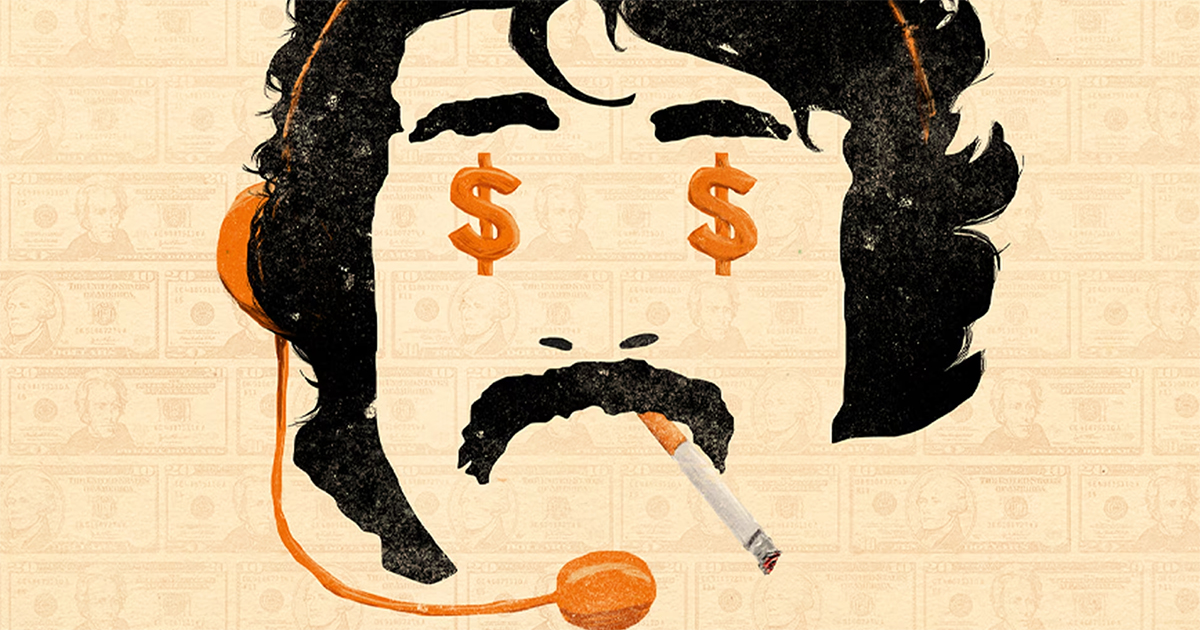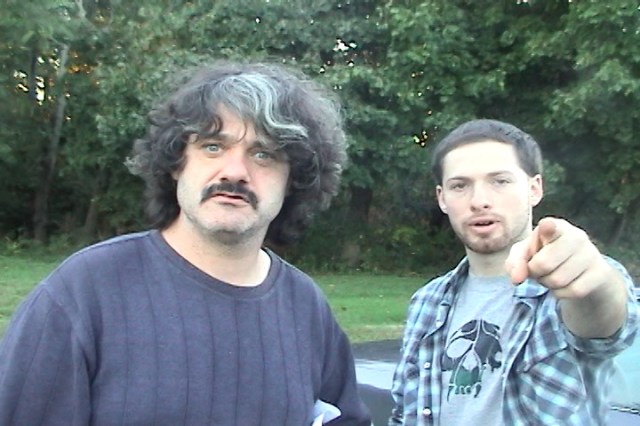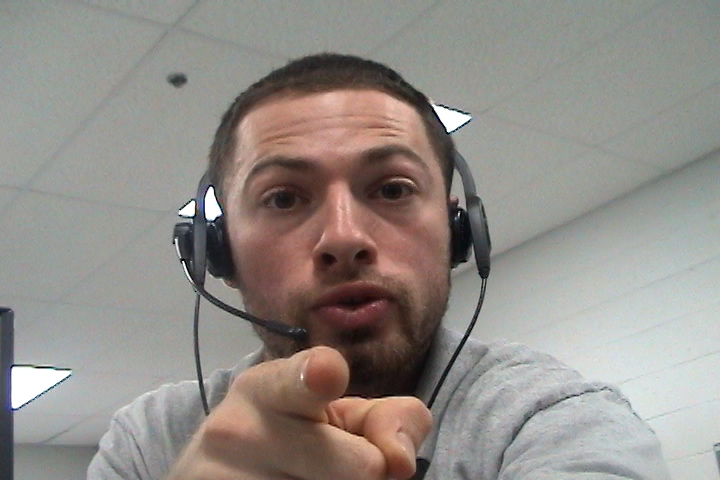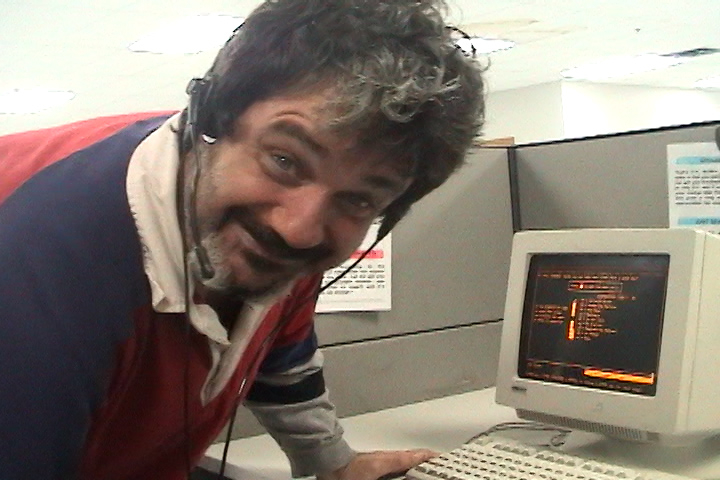
From “Telemarketers,” courtesy of HBO
TL;DR
- Telemarketers is the latest true-crime story to capture the imagination of U.S. viewers, featuring a series of faux-charity scams and the efforts of an unlikely duo to expose the crimes.
- This three-episode HBO docuseries features one of its co-directors in the role of protagonist as his workplace drama became an exposé and then a documentary… about making a documentary.
- Co-director Adam Bhala Lough helped Sam Lipman-Stern comb through more than 200 hours of footage, spanning two decades, to tell this story.
If you think you know what you’re in for when you start to watch HBO’s new three-part docuseries Telemarketers, odds are you’ll only be half right. Maybe.
To be fair, that’s because the project quite literally spans more than 20 years and, as Vulture’s Nate Jones put it, “part Jackass-style debauchery, part Michael Moore–style exposé, and a fantastically fluorescent piece of Bush-era kitsch.” It’s also, sort of, “a documentary about making a documentary” (at least in its third act).
HBO Documentary Films describes Telemarketers (a bit more coherently) as “a madcap story of an unruly, low-wage environment and two long-time office buddies who find themselves hot on the trail of a sobering look at the dark side of American capitalism and the misuse of consumer trust.”
Time’s reviewer Judy Berman summarizes: “A clumsy scam cooked up by four crooks, three decades ago, eventually intersects with some of the gravest contemporary threats: political polarization, dystopian misuse of artificial intelligence, the rise of PACs, legislators’ impotence in the face of police corruption.” She also happens to think the resulting project is “exciting documentaries I’ve seen in years.”
Now, if we’ve learned anything about the American viewing public, Berman will be far from alone as a Telemarketers fan. We love watching a good fraud unfold.
But this project is unique in that it’s brought to us by some of the original scammers themselves — Sam Lipman-Stern and Patrick J. “Pat” Pespas — and, they allege in the film, the real crime is ongoing today, reaching $1 billion dollars.

“After all these years of documenting this, it’s bigger, crazier, and less regulated than it’s ever been,” Lipman-Stern told the New York Times.
Not only is the scale eye-popping, but the cast of characters seems almost too good for true crime.
Lipman-Stern and Pespas ‟aren’t John Oliver or Michael Moore, but their amateur charm and naive bravery create something even more rewarding: a passionate example of citizen journalism at its very best,” writes Matt Schimkowitz for AV Club.
“It felt like you [were] walking straight into a Steinbeck or Kerouac novel. It was this place that was just full of these incredible, larger-than-life characters,” Lipman-Stern told Rollingstone’s David Fear in an interview about the show and his experience working at Civic Development Group, the telemarketing firm that hired him as 14 year-old dropout and would eventually become a focus of the docuseries.
Now, not only did New Jersey-based CDG not take issue with underage hiring, it was an environment in which Lipman-Stern says his manager “Big Ed encouraged [him] to bring in his camcorder” after they had a conversation about “how the anything goes culture at CDG would make an unbelievable documentary.”
After all, CDG allowed whatever it took for the sales to roll on, and for Lipman-Stern, that meant filming his coworkers (a practice I can’t imagine any company allowing in 2023, but for CDG was innocuous, compared to the drugs and sex other employees “required”).

Nonetheless, Fear notes that the employees and the antics (which sound vaguely Wolf of Wall Street to me) are not the backbone of Telemarketers. Ultimately, it’s the Russian doll nature of the underlying scam. The Federal Trade Commission shut down CDG in 2010, but that just meant that another group of companies took its place, and on and on.
Lipman-Stern’s relative-by-marriage Adam Bhala Lough agreed to co-direct the project after seeing footage of the charismatic, telemarketing-talented Pespas. Bhala Lough was the one to recognize that investigation of the ongoing scam needed to be the organizing principle driving the project.
READ MORE: HBO’s ‘Telemarketers’ Exposes a Billion-Dollar Scam the Cops Are in On (Rolling Stone)
And the project needed both an organizing idea and a lot of actual organization.
Bhala Lough told IndieWire that the 200+ hours of footage Lipman-Stern had gathered “was a mess. Nothing was labeled. But within the mess was a lot of gold. It was overwhelming.”
For a documentary with such humble origins, Lipman-Stern’s connections shone.

IndieWire’s Eric Kohn observes: “The series is co-produced by the Safdie brothers’ Elara Pictures and Rough House Pictures, the company co-founded by David Gordon Green, Jody, Hill, and Danny McBride (where Bhala Lough oversees nonfiction projects). The outcome feels like a natural extension of both companies’ fiction work: The grimy backdrop and anarchic circumstances of CDG echo the Safdies’ Uncut Gems and Good Time, while many of its rough-and-tumble characters wouldn’t look out of place alongside McBride’s overbearing, self-righteous eccentric in Eastbound and Down and his other work.”
It took 13 months to shape, repackage and develop Lipman-Stern’s material but, eventually, HBO also signed the project.
And even when the funding and the infrastructure became more traditional, Lipman-Stern and Pespas did not alter their methodology (which was blessed by Bhala Lough), even though that meant Lipman-Stern filming an eight-hour Florida road trip via GoPro and having the editor comb through all of the footage.
READ MORE: Drugs, Fraud, Whistleblowers, and the Safdies: Inside the 22-Year Journey of HBO’s Bombshell Miniseries ‘Telemarketers’ (Indie Wire)
So what is the end result? ‟Telemarketers takes on a Boyhood quality,” writes Schimkowitz, ‟as we watch Sam and Pat age from episodes one to three, showing us what life on the phone does to people.”
Their transition, from scammers and ne’er-do-wells to citizen journalists with a cause, is the heart of the limited series, which is often funny, at times outrageous, and consistently human.
For Schimkovitz, this is what defines the show: ‟Telemarketers doesn’t treat Pat like Tiger King’s Joe Exotic, the meme-ready punchline of Netflix’s true-crime sensation. Instead, the show recalls Tiger King executive producer Chris Smith’s early breakthrough American Movie, a true story of determination despite inexperience and a lack of financial backing. Their naivety and their ignorance make their reactions relatable and cathartic. The filmmakers are as shocked as we are when they discover the limits of their knowledge and the breadth of the scam. It’s this unpretentiousness that makes the journey all the more endearing.”


